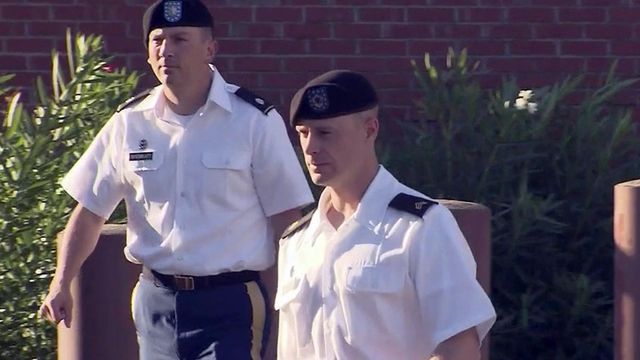General to testify about burning letters in Bergdahl case
The judge overseeing Army Sgt. Bowe Bergdahl's military trial said Monday that a top general must testify about destroying letters that he received from supporters and critics of the soldier who walked off his post in Afghanistan.
Posted — UpdatedThe judge, Army Col. Jeffery Nance, also cast doubt on the viability of an early 2017 trial date for Bergdahl, but stopped short of changing it.
Bergdahl, 30, of Hailey, Idaho, walked off his post in Afghanistan in 2009 and wound up as a captive of the Taliban and its allies until 2014. The Obama administration won his release by swapping him for five Guantanamo Bay detainees.
Bergdahl, who remains on desk duty at Fort Sam Houston in Texas, faces a court-martial on charges of desertion and misbehavior before the enemy. The latter charge carries up to a life sentence.
Gen. Robert Abrams, commander of Army Forces Command at Fort Bragg, was the man who decided to send Bergdahl's case to trial, and defense attorneys argue that Abrams should be disqualified and his referral to a court-martial scrapped.
For one thing, the defense said, Abrams burned more than 100 letters from the public about the Bergdahl case, something the defense team calls destroying evidence.
"We know the letters span the spectrum of opinion, which means some number of them were hostile to Sgt. Bergdahl – for all we know hostile to the the defense team – but we will never know what they said," civilian defense attorney Eugene Fidell said.
Fidell wants to cross-examine Abrams about the letters and whether they had any influence on his decision to send the case to trial. Abrams told the defense in an interview months ago that he never read the letters.
Prosecutors say the letters didn't constitute evidence and that Abrams shouldn't be required to testify, nor should he be disqualified.
"Bringing him into court to testify would provide no value," said prosecutor Maj. Justin Oshana, who noted that defense lawyers have already interviewed Abrams outside of court.
Nance expressed skepticism about the relevance of the letters, which Abrams put in a "burn bag" to be incinerated, but the judge ruled that the general must testify on Wednesday.
Abrams has been traveling and has the option to testify in person or by phone at a pretrial hearing this week.
"There are some questions I have to ask about the 100 or so letters," Nance told the lawyers.
Bergdahl's defense team also cite Abrams' prior role advising former U.S. Defense Secretary Chuck Hagel during efforts to return Bergdahl from captivity and questions about whether Abrams considered defense objections to the findings of a preliminary hearing.
The defense is seeking a reset in the case that would allow another commander to decide whether it warrants a general court-martial.
The judge also said Monday that defense attorneys can propose a significant revamping of pretrial deadlines, and he may consider changing the trial date in the future.
The defense has argued that trial deadlines have been jeopardized by the pace at which prosecutors are producing classified information. Prosecutors acknowledged Monday that they were likely to miss an upcoming deadline on the documents, saying it's taking time to get military and intelligence agencies to review them.
Fidell said after the hearing that there is "a lot of doubt" surrounding the February trial date.
On Tuesday, defense attorneys are scheduled to argue a separate motion that public comments by U.S. Sen. John McCain impermissibly tainted the case. McCain has called for a congressional hearing if Bergdahl isn't punished.
If Nance doesn't dismiss the case, the defense has asked him to give Bergdahl a sentence of no punishment.
"Sgt. Bergdahl has basically been in a holding pattern for two years since his liberation from the Haqqani network in Afghanistan and Pakistan," Fidell said. "This sort of period of limbo is a time that none of us can feel good about."
Related Topics
• Credits
Copyright 2024 by WRAL.com and the Associated Press. All rights reserved. This material may not be published, broadcast, rewritten or redistributed.






